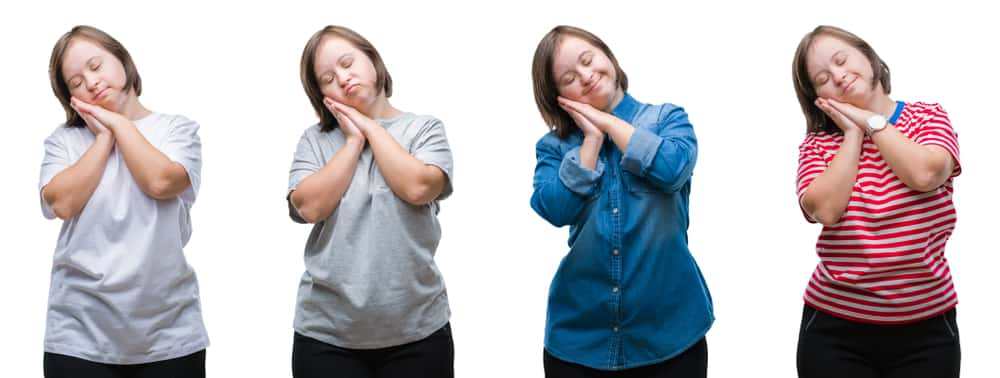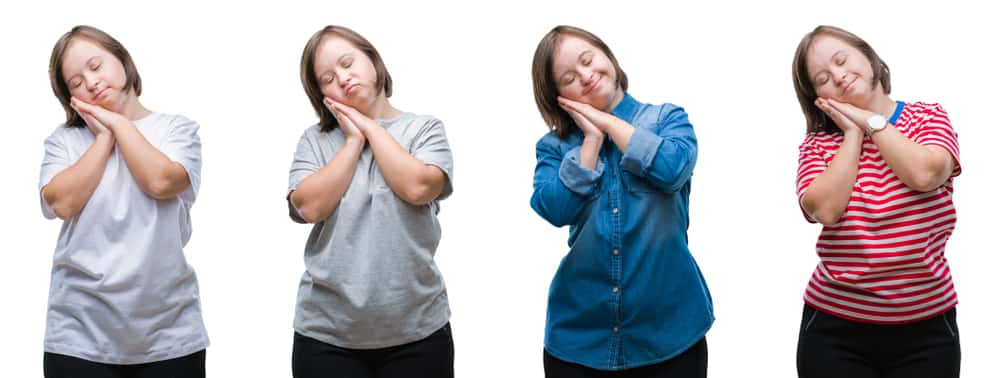Inspire Sleep Apnea Device and Down's Syndrome
June 5th, 2023 | 4 min. read


Children with Down syndrome are at a greater risk of developing obstructive sleep apnea, with the current treatments often proven effective.
The Food and Drug Administration (FDA) has approved Inspire therapy for pediatric patients of 13 years of age or older with Down syndrome who suffer from obstructive sleep apnea with an apnea-hypopnea index between 10 and 50.
Although earlier Inspire therapy was only approved for 18 years old and above, now with FDA approval, the treatment now can help adolescents with sleep apnea who cannot benefit from continuous positive airway pressure (CPAP).
Interested in learning more about Inspire and treating Down Syndrome in Houston?
Please schedule an appointment at one of our 10 convenient locations throughout Houston, TX, today.
Inspire Sleep Apnea Device for Adolescents with Down Syndrome
Inspire therapy was initially prescribed to adults with Down syndrome. After a series of clinical trials, the FDA has approved the use of Inspire sleep apnea devices to treat adolescents 13 years of age and older with Down syndrome suffering from sleep apnea.
Inspire sleep apnea device is developed by Inspire Medical Systems. This medical technology company has developed minimally invasive neurostimulation technology to offer a safe and effective treatment for moderate to severe obstructive sleep apnea.
Adolescents with Down syndrome can be treated with Inspire if:
- They are 13 years of age and above.
- They have moderate to severe obstructive sleep apnea (OSA).
- They have an apnea-hypopnea index between 10 and 50.
- They do not benefit from traditional CPAP therapy.
Inspire Therapy Using a Sleep Apnea Device
Inspire therapy is an FDA-approved neurostimulation device that consists of a generator, a stimulation, and a sensing lead. The device is placed under the skin of the chest through a same-day outpatient procedure.
Inspire is controlled by a small hand-held remote. Before going to sleep, a person with sleep apnea must click the remote to turn the device on. While sleeping, Inspire opens the airway, preventing sleep apnea and allowing you to sleep peacefully.
How does it work?
When the device senses someone trying to take a breath, it sends an electric pulse to the hypoglossal nerves that control tongue movement, causing the tongue to move forward and unblock the airways.
Who can benefit?
People with sleep apnea can qualify for Inspire therapy if they meet the following requirements.
- They are diagnosed with moderate to severe sleep apnea.
- They struggle with or do not get benefits from CPAP treatments.
- They are 18 years of age or older.
- They are not significantly obese.
What is sleep apnea?
Sleep apnea is a common disorder that causes breathing to stop or become shallow during sleep. The pauses in breathing can last for a few seconds to several minutes, which leads to decreased oxygen levels and frequent awakening during the night.
Sleep apnea can be of two main types:
- Obstructive sleep apnea: It is the common type of sleep apnea that causes airways to collapse or get blocked during sleep.
- Central sleep apnea: It is less common and happens when the brain fails to send correct signals to the muscles that control breathing.
Symptoms of Sleep Apnea in Children
The common symptoms of sleep apnea are:
- Tossing and turning in bed
- Chronic mouth breathing while sleeping
- Long pauses in breathing
- Night sweats
Other signs that may indicate sleep apnea are:
- Frequent waking up during the night
- Restless sleep
- Heavy breathing
- Gasping noises
- Snoring
- Sternal retractions
- High inspiratory squeaks
- Excessive daytime sleepiness
- Failure to thrive
- ADHD/ADD
Sleep Apnea and Children with Down Syndrome
Children with Down syndrome can have more severe sleep apnea symptoms than other children.
According to studies, nearly 80% of children with Down syndrome have sleep apnea compared to less than 5% of children without Down syndrome. The increased prevalence may be due to:
- Poor coordination of airway movements
- Obesity
- Differences in facial structure
- Low muscle tone
- Narrow airways in the throat and nose
Impact of Sleep Apnea on Children with Down Syndrome
Sleep apnea, when left untreated, in children with Down's syndrome can result in aggressive behaviors, brain fogging, and a decrease in decreased memory, language, and emotional control.
Other Sleep Apnea Treatments in Children with Down Syndrome
Besides Inspire therapy, other sleep apnea treatments in children include the below:
Adenoid and Tonsil Removal Surgery
Traditionally, adenoid and/or tonsils removal surgery is done to open up the airways in children with Down syndrome suffering from sleep apnea. However, less than 30% of children with Down syndrome benefit from the procedure. This may be because children with Down syndrome are more likely to have a larger tongue.
Use of CPAP/BiPAP
CPAP:
The next treatment option is CPAP therapy, a noninvasive treatment for obstructive sleep apnea patients.
The treatment involves a CPAP (Continuous positive airway pressure) machine. It is a device that releases a steady stream of oxygenated air into a person's airway through a flexible tube attached to a mask around a person's mouth and nose.
The steady airflow pushes any obstruction, keeping the airways open for breathing while asleep.
BiPAP:
BiPAP (Bilevel Positive Airway Pressure) machines deliver oxygenated air at two pressure levels, an inhale pressure and an exhale pressure to a person's airways through a mask. It is effective in people who cannot tolerate CPAP treatment.
Although CPAP and BiPAP therapy work for most people, children with Down syndrome can feel fidgety or experience sensory issues that prevent them from tolerating wearing masks at night.
Sleep Apnea Treatment with Inspire at Houston ENT & Allergy Clinic
Houston ENT & Allergy is offering Inspire therapy, a breakthrough in treating obstructive sleep apnea (OSA) for people who cannot tolerate traditional Continuous Positive Air Pressure (CPAP) therapies.
Following the recent FDA approvals, we at Houston ENT & Allergy Clinic offer sleep apnea treatments using Inspire devices to adolescents with Down syndrome.
Inspire devices are developed by Inspire Medical Systems, a medical technology company that offers innovative, minimally invasive solutions to people suffering from obstructive sleep apnea.
Inspire Therapy is the first and only FDA-approved neurostimulation technology offering safe and effective treatment to people who cannot tolerate traditional CPAP treatment options.
Obstructive sleep apnea can occur when the airways collapse during sleep, blocking oxygen flow to the brain. The obstructed airways cause breathing lapses, leading to sleep disruption while affecting the quality of life.
Obstructive sleep apnea can cause serious health hazards if left untreated. It can significantly increase the risk of heart attack, stroke, diabetes, memory loss, and other cardiovascular and metabolic diseases.
Lack of sleep due to OSA can cause daytime drowsiness, making one susceptible to workplace and automobile accidents. People with Down syndrome are likely to experience severe symptoms of OSA. They may require specialized treatments for their sleep apnea symptoms.
About Houston ENT & Allergy
Houston ENT & Allergy Clinic has offered exceptional care for ENT, allergy, and hearing needs since 1907.
Our experienced specialists provide high-quality treatment for all your ENT and allergy-related concerns, including sleep apnea and snoring problems.
Houston ENT & Allergy currently has ten convenient locations in Houston, Texas. Many of these locations provide Inspire Sleep Apnea Device therapy as an option to treat your OSA.
Schedule an appointment to see if Inspire therapy is right for you or your child’s situation.
Topics:
